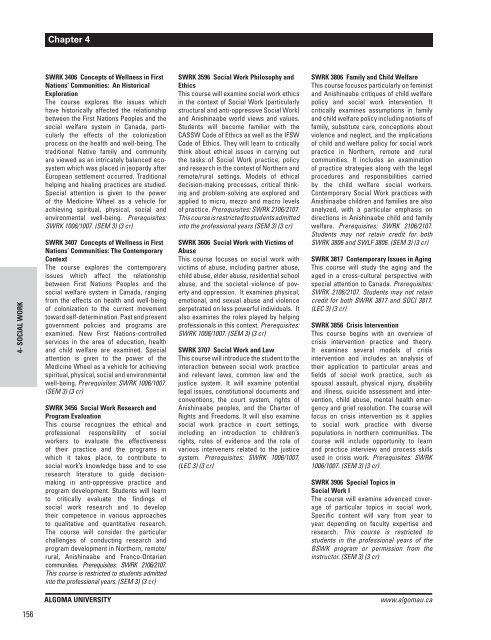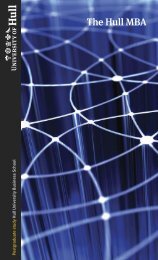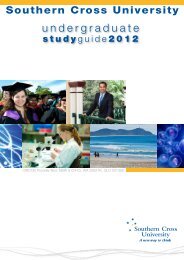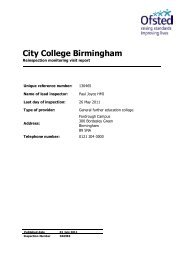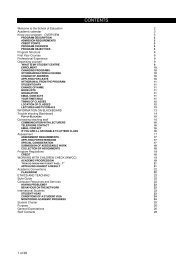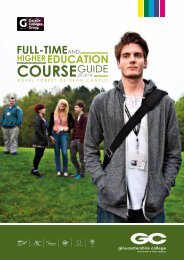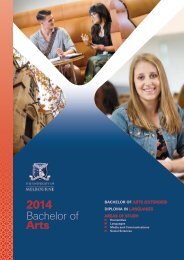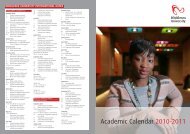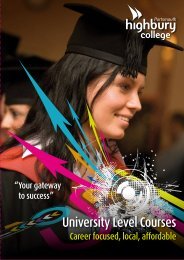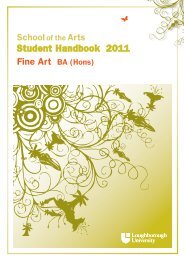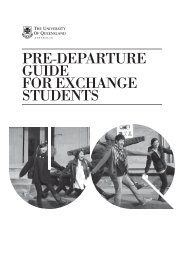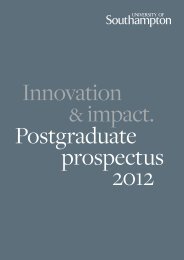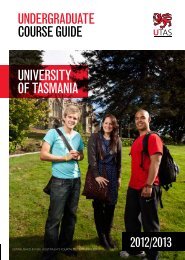You also want an ePaper? Increase the reach of your titles
YUMPU automatically turns print PDFs into web optimized ePapers that Google loves.
Chapter 4<br />
4- SOCIAL WORK<br />
SWRK 3406 Concepts of Wellness in First<br />
Nations’ Communities: An Historical<br />
Exploration<br />
The course explores the issues which<br />
have historically affected the relationship<br />
between the First Nations Peoples and the<br />
social welfare system in Canada, particularly<br />
the effects of the colonization<br />
process on the health and well-being. The<br />
traditional Native family and community<br />
are viewed as an intricately balanced ecosystem<br />
which was placed in jeopardy after<br />
European settlement occurred. Traditional<br />
helping and healing practices are studied.<br />
Special attention is given to the power<br />
of the Medicine Wheel as a vehicle for<br />
achieving spiritual, physical, social and<br />
environmental well-being. Prerequisites:<br />
SWRK 1006/1007. (SEM 3) (3 cr)<br />
SWRK 3407 Concepts of Wellness in First<br />
Nations’ Communities: The Contemporary<br />
Context<br />
The course explores the contemporary<br />
issues which affect the relationship<br />
between First Nations Peoples and the<br />
social welfare system in Canada, ranging<br />
from the effects on health and well-being<br />
of colonization to the current movement<br />
toward self-determination. Past and present<br />
government policies and programs are<br />
examined. New First Nations-controlled<br />
services in the area of education, health<br />
and child welfare are examined. Special<br />
attention is given to the power of the<br />
Medicine Wheel as a vehicle for achieving<br />
spiritual, physical, social and environmental<br />
well-being. Prerequisites: SWRK 1006/1007.<br />
(SEM 3) (3 cr)<br />
SWRK 3456 Social Work Research and<br />
Program Evaluation<br />
This course recognizes the ethical and<br />
professional responsibility of social<br />
workers to evaluate the effectiveness<br />
of their practice and the programs in<br />
which it takes place, to contribute to<br />
social work’s knowledge base and to use<br />
research literature to guide decisionmaking<br />
in anti-oppressive practice and<br />
program development. Students will learn<br />
to critically evaluate the findings of<br />
social work research and to develop<br />
their competence in various approaches<br />
to qualitative and quantitative research.<br />
The course will consider the particular<br />
challenges of conducting research and<br />
program development in Northern, remote/<br />
rural, Anishinaabe and Franco-Ontarian<br />
communities. Prerequisites: SWRK 2106/2107.<br />
This course is restricted to students admitted<br />
into the professional years. (SEM 3) (3 cr)<br />
SWRK 3596 Social Work Philosophy and<br />
Ethics<br />
This course will examine social work ethics<br />
in the context of Social Work (particularly<br />
structural and anti-oppressive Social Work)<br />
and Anishinaabe world views and values.<br />
Students will become familiar with the<br />
CASSW Code of Ethics as well as the IFSW<br />
Code of Ethics. They will learn to critically<br />
think about ethical issues in carrying out<br />
the tasks of Social Work practice, policy<br />
and research in the context of Northern and<br />
remote/rural settings. Models of ethical<br />
decision-making processes, critical thinking<br />
and problem-solving are explored and<br />
applied to micro, mezzo and macro levels<br />
of practice. Prerequisites: SWRK 2106/2107.<br />
This course is restricted to students admitted<br />
into the professional years (SEM 3) (3 cr)<br />
SWRK 3606 Social Work with Victims of<br />
Abuse<br />
This course focuses on social work with<br />
victims of abuse, including partner abuse,<br />
child abuse, elder abuse, residential school<br />
abuse, and the societal violence of poverty<br />
and oppression. It examines physical,<br />
emotional, and sexual abuse and violence<br />
perpetrated on less powerful individuals. It<br />
also examines the roles played by helping<br />
professionals in this context. Prerequisites:<br />
SWRK 1006/1007. (SEM 3) (3 cr)<br />
SWRK 3707 Social Work and Law<br />
This course will introduce the student to the<br />
interaction between social work practice<br />
and relevant laws, common law and the<br />
justice system. It will examine potential<br />
legal issues, constitutional documents and<br />
conventions, the court system, rights of<br />
Anishinaabe peoples, and the Charter of<br />
Rights and Freedoms. It will also examine<br />
social work practice in court settings,<br />
including an introduction to children’s<br />
rights, rules of evidence and the role of<br />
various interveners related to the justice<br />
system. Prerequisites: SWRK 1006/1007.<br />
(LEC 3) (3 cr)<br />
SWRK 3806 Family and Child Welfare<br />
This course focuses particularly on feminist<br />
and Anishinaabe critiques of child welfare<br />
policy and social work intervention. It<br />
critically examines assumptions in family<br />
and child welfare policy including notions of<br />
family, substitute care, conceptions about<br />
violence and neglect, and the implications<br />
of child and welfare policy for social work<br />
practice in Northern, remote and rural<br />
communities. It includes an examination<br />
of practice strategies along with the legal<br />
procedures and responsibilities carried<br />
by the child welfare social workers.<br />
Contemporary Social Work practices with<br />
Anishinaabe children and families are also<br />
analyzed, with a particular emphasis on<br />
directions in Anishinaabe child and family<br />
welfare. Prerequisites: SWRK 2106/2107.<br />
Students may not retain credit for both<br />
SWRK 3806 and SWLF 3806. (SEM 3) (3 cr)<br />
SWRK 3817 Contemporary Issues in Aging<br />
This course will study the aging and the<br />
aged in a cross-cultural perspective with<br />
special attention to Canada. Prerequisites:<br />
SWRK 2106/2107. Students may not retain<br />
credit for both SWRK 3817 and SOCI 3817.<br />
(LEC 3) (3 cr)<br />
SWRK 3856 Crisis Intervention<br />
This course begins with an overview of<br />
crisis intervention practice and theory.<br />
It examines several models of crisis<br />
intervention and includes an analysis of<br />
their application to particular areas and<br />
fields of social work practice, such as<br />
spousal assault, physical injury, disability<br />
and illness, suicide assessment and intervention,<br />
child abuse, mental health emergency<br />
and grief resolution. The course will<br />
focus on crisis intervention as it applies<br />
to social work practice with diverse<br />
populations in northern communities. The<br />
course will include opportunity to learn<br />
and practice interview and process skills<br />
used in crisis work. Prerequisites: SWRK<br />
1006/1007. (SEM 3) (3 cr)<br />
SWRK 3906 Special Topics in<br />
Social Work I<br />
The course will examine advanced coverage<br />
of particular topics in social work.<br />
Specific content will vary from year to<br />
year depending on faculty expertise and<br />
research. This course is restricted to<br />
students in the professional years of the<br />
BSWK program or permission from the<br />
instructor. (SEM 3) (3 cr)<br />
ALGOMA UNIVERSITY<br />
www.algomau.ca<br />
156


